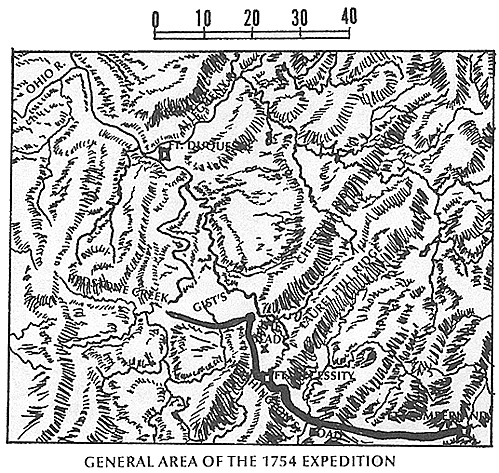
Washington, joined by his Indian scouts and a few of the true frontiersmen, pushed on to the Great Meadows, near present day Farmington, Pennsylvania, alongUS Rt. 40. On May 24,1754, Washington started to organize his base camp at the Great Meadows by cutting brush, forming up his wagons, and allowing the horses and cattle graze in this oasis of grass in the forested wilderness.
The French were aware of Washington's presence so close to their Fort Duquesne. Captain Claude-Pierre Pecaudy, Sieur de Contrecoeur, commanderof thefort, sent Ensign Coulon dejumonville with aforce of about thirty-three men to the Great Meadows. Jumonville was either to spy on the British intruders or lead a diplomatic mission to warn the British that they were in French territory and were expected to leave the area at once. The exact nature of Jumonville's orders are in question, but are important in history's judgement of Washington's actions. We will return to this topic later.
On the morning of May 27, 1754, Christopher Gist, one of the frontiersmen, rode into Washington's camp to warn him of French troops in the vicinity of the Great Meadows. After 8pm that same day, an Indian scout named Silverheels brought a message from Half-King, Washington's Indian chief of intelligence, that a party of French regulars were camped only six miles away.
Washington gathered a force of forty men and with Captain Adam Stephen moved out to reconnoiter the French position. They followed Silverheels through the forest during the black night punctuated by frequent, heavy rain. The party made contact with Half-King and his band of ten warriors at about dawn on the morning of May 28.
The French were camped close to the sheer rock ledge that bordered the northwest side of a narrow ravine about 1200 yards long and 300 yards wide. It was now close to 7 AM, and they were in the process of getting dressed and making breakfast. Washington sent Capt. Stephen and about half of the troops to the left side of the ravine. Stephen sent part of his group to the top of the ledge where they could straight down upon the French. Washington himself took the rest of the men to the more exposed position on the right on a slight rise to the southeast. Half-King with his party of ten braves moved to the far side of the French blocking a possible escape route to the northeast. For several minutes the British silently watched the French go about their morning chores.
Suddenly a call of alarm went up in the French camp. Some of the half dressed regulars went for their muskets, neatly stacked under a rock outcropping to keep them dry. Washington ordered his men to fire. The order was almost simultaneously given by Stephen. The damp ravine was filled with the smoke and the acrid smell of discharged muskets. Several Frenchmen had fallen. Those still on their feet tried to escape through the passage at the far end of the ravine, only to be met by Half-Kingand his warriors. The Indians with blood lust in their eyes and tomahawks in their hands fell upon the French survivors of the musket volley. The French, pushed back into the ravine by the Indians, turned toward the Virginia militiamen, dropped their weapons, and surrendered.
Washington accepted the surrender and did his best to stop the Indian scalping of the dead and killing of the wounded French. Washington refused demands made by the Indians for the prisoners.
In fifteen minutes it was all over. Washington lost one man killed and several were wounded. He had twenty one prisoners and ten French soldiers lay dead in the ravine. The leader of the French party, Ensign Jumonville, was among the dead, killed by a blow from Half-King's tomahawk. One half naked French survivor, Mouceau, was undetected and took off through the woods to deliver the news of the skirmish to Contrecoeur at Fort Duquesne.
Washington expected retaliation from the French and he began to prepare for the anticipated onslaught. He sent the French prisoners under light guard to Winchester. Christopher Gist was dispatched to Governor Dinwiddie with a report about the lack of promised supplies and an inquiry about the arrival of said supplies and the additional troops. Washington also started the building of the small stockaded fort in the Great Meadows that became known as Fort Necessity.
More Rid the Ohio of the French
Back to Table of Contents -- Courier Vol. VIII No. 3
To Courier List of Issues
To MagWeb Master Magazine List
© Copyright 1988 by The Courier Publishing Company.
This article appears in MagWeb (Magazine Web) on the Internet World Wide Web.
Other military history articles and gaming articles are available at http://www.magweb.com